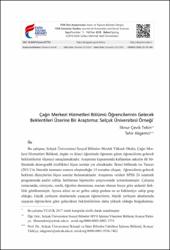Çağrı Merkezi Hizmetleri Bölümü Öğrencilerinin Gelecek Beklentileri Üzerine Bir Araştırma: Selçuk Üniversitesi Örneği
Künye
ÇEVİK TEKİN, İlknur, & Tahir AKGEMCİ. "Çağrı Merkezi Hizmetleri Bölümü Öğrencilerinin Gelecek Beklentileri Üzerine Bir Araştırma: Selçuk Üniversitesi Örneği. "FSM İlmî Araştırmalar İnsan ve Toplum Bilimleri Dergisi, 11 (2018): 151-164.Özet
Bu çalışma, Selçuk Üniversitesi Sosyal Bilimler Meslek Yüksek Okulu, Çağrı Merkezi
Hizmetleri Bölümü, örgün ve ikinci öğretimde öğrenim gören öğrencilerin gelecek
beklentilerini ölçmeyi amaçlamaktadır. Araştırma kapsamında kullanılan anketin ilk bölümünde
demografik özellikleri ölçen sorular yer almaktadır. İkinci bölümde ise Tuncer
(2011)’in literatür taraması sonucu oluşturduğu 14 sorudan oluşan, öğrencilerin gelecek
beklenti düzeylerini ölçen sorular bulunmaktadır. Araştırma verileri SPSS 24 istatistik
programında analiz edilip, belirlenen hipotezler çerçevesinde yorumlanmıştır. Çalışma
sonucunda; cinsiyete, sınıfa, öğretim durumuna, mezun olunan liseye göre anlamlı farklılık
görülmemiştir. Ayrıca ailesi en az gelire sahip grubun en az beklentiye sahip grup
olduğu, küçük yerleşim alanlarında yaşayan öğrencilerin, büyük yerleşim alanlarında
yaşayan öğrencilere göre gelecekten beklentilerinin daha yüksek olduğu bulgulanmıştır. Öğrencilerin kardeş sayıları arttıkça genel olarak gelecek beklentilerinin arttığı yine
çalışma sonucu elde edilen istatistiki bulgular arasındadır. This study aims to measure the future expectations of the students who are studying
in daytime and evening education in Selcuk University Social Sciences Vocational High
School, Call Center Services Department. In the first part of the questionnaire used in the
survey, questions that measure demographic characteristics are included. In these condpart,
Tuncer (2011) has questions that measure the future expectation levels of students,
consisting of 14 questions which are the result of the literature search. The data of the
research was be analyzed in SPSS 24 statistical program and interpreted within the frame
work of determined hypotheses. In the results of working; There were no significant differences
in terms of sex, class, teaching status, graduation grade. It was also found that the
family with the least family had the least expectant group, the students living in the small
residential areas had a higher expectation than the students living in the big residential
areas. As the number of siblings of students increases, expectations of future increases in
general are again found to be statistically significant findings.



















